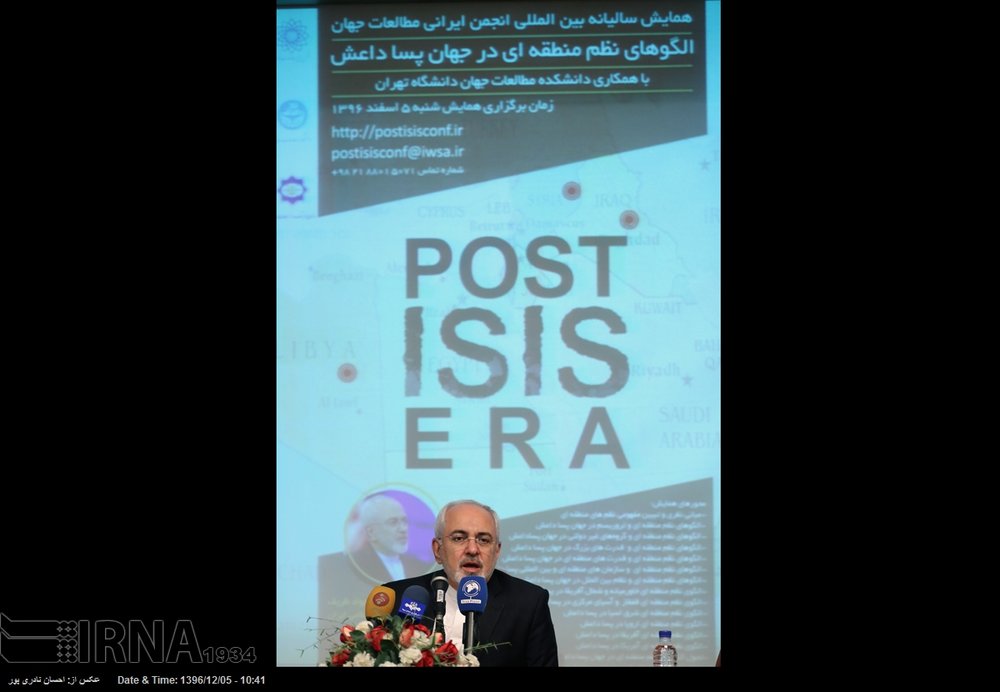Daesh has lost territory but its ideology exists, Zarif says

TEHRAN – Iranian Foreign Minister Mohammad Javad Zarif said on Saturday that although Daesh has lost territory but its ideology has not been rooted out.
“Today, we are witnessing territorial defeat of Daesh and not defeat of the ideology of Daesh,” Zarif said in a conference on post-ISIS era at the University of Tehran.
The chief diplomat said the “ideological and financial resources of Daesh” which originate from the region and beyond “have not been annihilated yet.”
Zarif said the ideological bases of Daesh are still being reinforced by petrodollars, warning that Daesh is being spread all over the world. “So long as the main elements of creating Daesh persist we should expect that this danger emerge from somewhere else.”
He added that the U.S. is relocating Daesh terrorists from Syrian cities of Mayadin and Dayr al-Zawr and other cities outside of the region and this means that the terror network is being widely dispersed.
On the sidelines of the conference, he told reporters, “Extremism and Daesh are still threat against the world. Planning is required to counter roots of this threat and the ideology behind it and also it is essential for the regional countries to cooperate and hold dialogue.”
He also said that Iran has played an important role in fighting Daesh through advisory help.
‘Certain regional countries give up independence to buy security’
In a separate conference at the University of Tehran, Zarif said certain countries in the Middle East region have given up “independence and dignity” to buy security.
In an indirect reference to Saudi Arabia and the United Arab Emirates, Zarif said there are countries in the region which spend billions of dollars annually buy arms because they think their security depends on countries outside of the region.
“They tremble by a sulk of the major powers and feel secure and delightful by a smile of them,” he said.
“If the regional countries, instead of looking outside, eyed on their own people for security, they would not tremble with a frown by Obama and delighted with a smile by Trump.”
Zarif says Saudi Arabia comes after the U.S. and China as the third biggest spender on arms with $67 billion a year but it looks to the West for its security.
Zarif noted that after the conclusion of the JCPOA - the official name for the nuclear deal - certain regional leaders “rushed to Camp David” protesting “why you left us alone. We are not safe and secure without you.”
He added, “We remember how state leaders were taken by ecstasy and thought they found new security when the guy (Donald Trump) came to our region and sword danced with them. We live in such a region.”
“Last year they spent $116 billion on arms in the Persian Gulf region. Saudi Arabia’s military expenditure is higher than that of Russia, which has to protect its nuclear weapons.”
The chief diplomat underlined that Saudi Arabia comes after the U.S. and China as the third biggest spender on arms with $67 billion a year. “Despite this, they still feel insecure. None of these countries feel safe and nobody in the world considers them safe.”
“One of the problems with them is that they claim despite all this spending, everyone is looking at somewhere else and other countries consider Iran as the most powerful, safest, and most promising in the region.”
He added, “Surely it is necessary for us to have the best tools so that once more a criminal like Saddam Hussein does not bombard our cities. This is not negotiable. But do our neighbors not have such tools? Do they not have arms and ultra-modern fighters and missiles?”
Pointing to harsh comments on Iran’s missile program, Zarif said, “Does not Saudi Arabia have missiles with 2,500 kilometers range? Do they not have the capability to carry nukes?”
“With all its vastness and population, Iran’s military expenditure is only 12 to 16 billion dollars. But what distinguishes us from them and gives us peace and security is nothing other than the people of Iran.”
Pointing to harsh comments on Iran’s missile program, Zarif said, “Does not Saudi Arabia have missiles with 2,500 kilometers range?”
If it was not so nobody could “milk” the regional countries, Zarif remarked.
The chief diplomat added, “It is a disgrace for our neighbors that the president of a country said I did not travel to that country (Saudi Arabia) until I had gotten promise for investment.”
Zarif urges U.S. to fulfill obligations under JCPOA
Speaking to reporters on the sidelines of the conference, Zarif also urged the U.S. to remain committed to its obligations under the 2015 nuclear deal.
He noted that a signatory to a multilateral agreement cannot set conditions to implement the deal.
In his new Iran policy announced on January 12, Trump said the U.S. will withdraw from the JCPOA if the terms of the agreement are not changed.
NA/PA
Leave a Comment